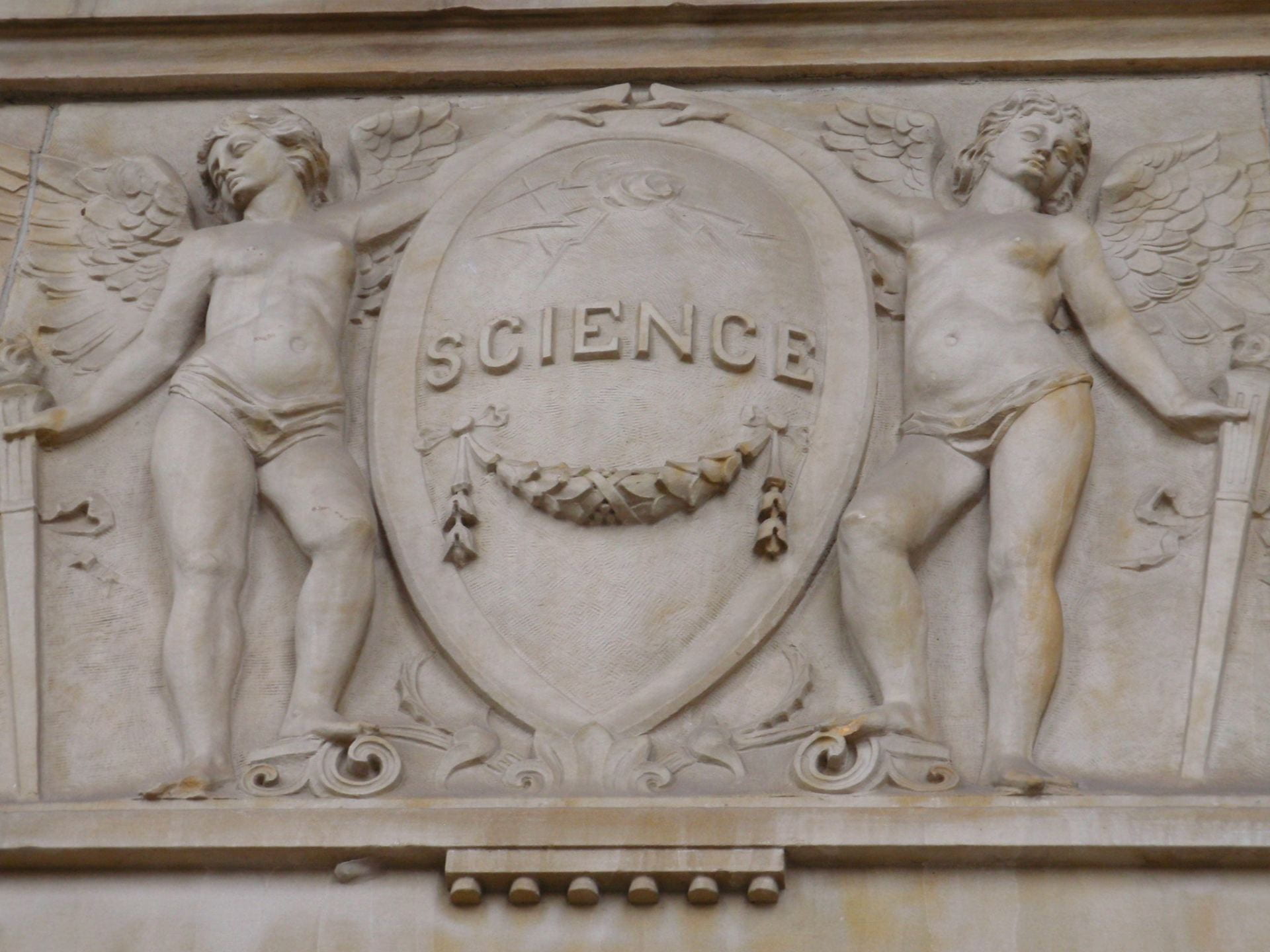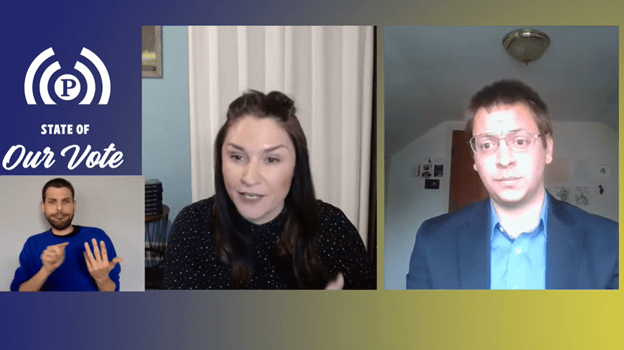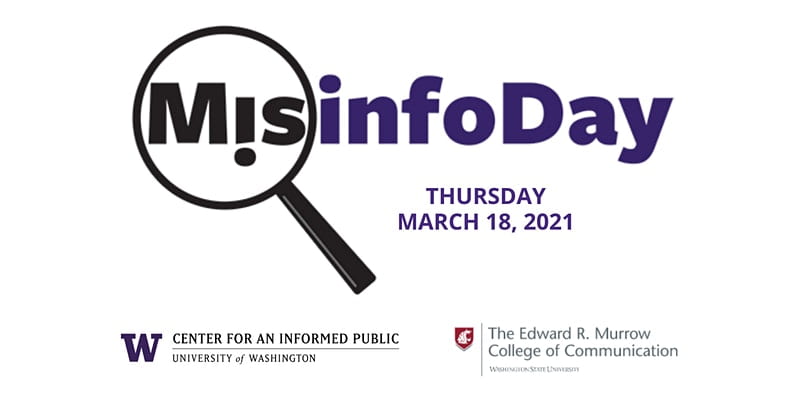This is a web version of the Center for an Informed Public’s News & Insights newsletter for April 2021, which was sent out on April 29. Check out our newsletter archives. Not signed up to received the CIP’s newsletter? Register here.
New PNAS paper explores ways scientific communication has ‘fallen victim to the ill effects of an attention economy’
When people think about misinformation, they often focus on popular and social media. But in a paper published April 12 in the Proceedings of the National Academy of Sciences, University of Washington Center for an Informed Public faculty members Jevin West and Carl Bergstrom write that scientific communication — both scientific papers and news articles written about papers — also has the potential to spread misinformation. The researchers note that doesn’t mean science is broken. “Far from it,” write West, an Information School associate professor, and Bergstrom, a Department of Biology professor. “Science is the greatest of human inventions for understanding our world and it functions remarkably well despite these challenges. Still, scientists compete for eyeballs just as journalists do.”
- Learn more in a UW News Q&A with West and Bergstrom …
- Read the paper, “Misinformation in and about science,” in the Proceedings of the National Academy of Sciences …
- Top photo by lert / Flickr via CC BY-NC-SA 2.0
NEWS: The Washington Post interviews CIP’s Kolina Koltai about Joe Rogan’s recent vaccine comments.
// READ MORE
EVENTS: iAffiliates Day 2021 focuses on mis- and disinformation.
// READ MORE
SPOTLIGHT
With limited YouTube data access, researchers ‘can’t see the larger-scale phenomena, like mis- and disinformation, with much resolution’
During an April 13 “Morning Edition” interview with National Public Radio‘s Rachel Martin, CIP cofounder Kate Starbird, a UW Department of Human Centered Design & Engineering associate professor, discussed the reasons why researchers have limited insights into how mis- and disinformation spreads on YouTube. Due to limits on access to the video platform’s data, “we really can’t see the larger scale phenomena, like misinformation and disinformation, with much resolution,” Starbird said. “We can see … pieces here and there, but we can’t systematically collect large-scale data to use in our reasearch.”
RESEARCH NOTES
CIP hosting ‘Challenges and Considerations for Misinformation Research’ virtual workshop on May 6
Attention academic and academic-adjacent researchers: The Center for an Informed Public is hosting a half-day virtual workshop, “Challenges and Considerations for Misinformation Research,” on May 6, an event that will bring together academic teams researching mis- and disinformation to reflect on research best practices, data ethics and hurdles, and the normative and epistemological foundations of our collective work.
***
Tanu Mitra, an iSchool assistant professor and CIP faculty member, received a Google Research Scholar Program award of $60,000 for Supporting Scalable Value-Sensitive Fact-Checking through Human-AI Intelligence.
***
“The race to curb the spread of COVID vaccine misinformation,” an April 16 Nature article that looks at how researchers are using strategies from the 2020 U.S. elections to track anti-vaccination propaganda online, featured the Virality Project, a collaboration from UW’s CIP, Stanford Internet Observatory, New York University, Graphika and other partners “working with public health agencies and social media platforms to identify, track and report disinformation that violates their rules.”
- A Virality Project team, including CIP postdoctoral fellows Rachel E. Moran and Kolina Koltai, iSchool graduate student Divya Suresh Kumar, UW School of Law student Nicole Buckley and undergraduate research assistants Connor Klentschy and Joseph Schafer, co-authored a March 28 blog post examining social media narratives related to “vaccine passports,” which they wrote have come to “represent the spectre of government surveillance and a loss of privacy to ‘Big Tech,’ and has been weaponized by anti-vaccine groups to sow further vaccine hesitation.”
- Koltai and Schafer co-authored an April 7 Virality Project blog post that examines how a statement from U.S. Rep. Marjorie Taylor Greene, linking the “mark of the beast” to vaccine passports, gained significant traction on Facebook and Twitter.
- CIP undergraduate research assistant Osiris Cruz-Antonio and iSchool graduate student Taylor Agajanian contributed to an April 17 rapid-response blog post about the federal recommendation to temporarily pause the use of the Johnson & Johnson COVID-19 vaccine.
- Koltai, Moran, Kumar and Klentschy contributed to an April 27 Virality Project blog post examining false “vaccine shedding” claims that purport that people who are vaccinated can spread the disease they’ve recently received protection from.
INSIGHTS
CIP’s Ryan Calo analyzes Federal Trade Commission warning on racially biased algorithms
After the Federal Trade Commission published an April 19 blog post warning businesses that using racially biased algorithms may violate federal law, including the FTC Act, the Fair Credit Reporting Act and the Equal Opportunity Act, CIP cofounder and UW School of Law professor Ryan Calo observed in a tweet thread — which was spotlighted by MIT Tech Review and Protocol — that the FTC blog post may be “signaling a shift in the way the FTC thinks about enforcing the FTC Act in the context of emerging technology.” Calo expanded on his observations in an interview with Marketplace Tech‘s Molly Wood and in an article published by The Conversation.
***
Calo also participated in an April 5 virtual discussion, “Science and Technology Studies Toolkit: A Guide for Handling Mis- and Disinformation,” hosted by the University of Notre Dame‘s Technology Ethics Center and featuring Mutale Nkonde, CEO of AI for the People.
***
HCDE PhD student Andrew Beers joins Oregon Secretary of State Shemia Fagan for City Club of Portland ‘State of Our Vote’ discussion
In an April 27 “State of Our Vote” virtual discussion with Oregon Secretary of State Shemia Fagan hosted by the City Club of Portland, CIP researcher Andrew Beers, a UW Department of Human Centered Design & Engineering PhD student, discussed key findings from “The Long Fuse: Misinformation and the 2020 Election,” the final report from the Election Integrity Partnership, a nonpartisan coalition of researchers from the CIP, Stanford Internet Observatory, Graphika and the Atlantic Council‘s DFRLab that identified, monitored and responded to voting-specific mis- and disinformation.
- Watch the City Club of Portland “State of Our Vote” discussion …
- Learn more about the Election Integrity Partnership’s final report …
***
CIP director Jevin West, an iSchool associate professor, shared insights about misinformation awareness, information literacy and lessons from Calling Bullshit: The Art of Skepticism in a Data-Driven World, the 2020 book he co-wrote with CIP faculty member Carl Bergstrom, during recent virtual discussions hosted by Humanities Washington and the 92Y in New York City.
CIP IN THE NEWS
Center for an Informed Public researchers have been regularly interviewed, quoted or otherwise featured in various local, regional, national and international news outlets, livestreams and podcasts. Recent highlights include:
Citing MisinfoDay, New York Times notes how students can educate their parents and grandparents about misinformation
In an April 2 piece that examining the challenges that the nation faces with misinformation, New York Times contributing opinion writer Timothy Egan detailed “three things we could do right now to clean up the river of falsities poisoning our democracy,” citing the good that misinformation awareness and educational programs like MisinfoDay, co-presented by the University of Washington‘s Center for an Informed Public and Washington State University‘s Edward R. Murrow College of Communication, can do not only for children, but their parents and grandparents, too.
***
During an April 7 interview during National Public Radio‘s “Morning Edition,” CIP postdoctoral fellow Kolina Koltai, who studies vaccine misinformation, discussed how misleading social media narratives about COVID-19 vaccines are being customized for different audience groups online. “For the first time in a very long time we have everyone deciding whether to vaccinate themselves as adults,” Koltai said. “We’re all becoming susceptible to anti-vaccine narratives that can be promoted in ways that are beyond anti-vaccination communities.” Listen to the NPR segment …
- Koltai was also recently interviewed by NBC News, Poynter, Cleveland.com and the Shelter in Place podcast.
***
- Alexander Heffner‘s PBS Open Mind podcast featured an April 6 interview with CIP cofounder and UW HCDE associate professor Kate Starbird, where she discussed the impacts of decisions by major social media platforms to remove Donald Trump and QAnon affiliated accounts. [The Open Mind / PBS]
- The Nation also featured research insights from Starbird about online mis- and disinformation. [The Nation]
- Starbird was also interviewed by Canadian sociologist Jean-Philippe Warren about the “collective production of mass delirium in the United States” in Montreal’s La Presse newspaper. [La Presse]
- CIP director and iSchool associate professor Jevin West was interviewed by The Sacramento Bee in an article about public communication campaigns to curb vaccine hesitancy. [The Sacramento Bee]






